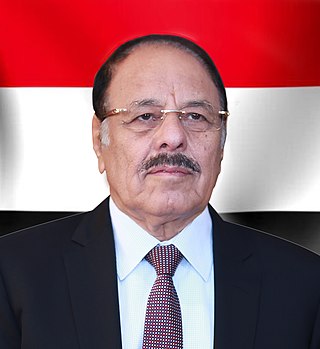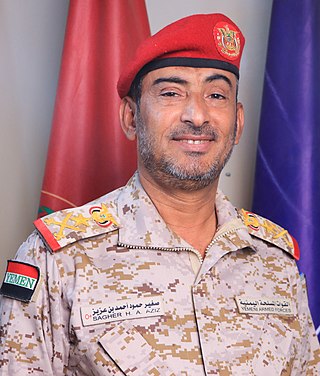Related Research Articles

The Egyptian Armed Forces are the military forces of the Arab Republic of Egypt. They consist of the Egyptian Navy,Egyptian Air Force and Egyptian Air Defense Forces. Previously,there was a separate command for the Egyptian Land Forces on March 25,1964,but it was officially abolished after the Six-Day War of 1967,so that the command of the land formations returned directly to the Chief of Staff of the Armed Forces,and the ground formations were divided to the forces east of the canal,under whose command the two armies and the military regions,in contrast to the rest of the forces,bodies,departments,and auxiliary agencies.

The Yemeni Armed Forces are the military forces of the Republic of Yemen. They include the Yemeni Army,Yemeni Navy and the Yemeni Air Force. Since the start of the current civil war in 2014,the armed forces have been divided;at first between loyalists of the former president Ali Abdullah Saleh and pro-Yemeni government forces of president Abdrabbuh Mansour Hadi;as of 2024,between the internationally recognized Presidential Leadership Council (PLC),and the Houthi-led Supreme Political Council (SPC). Per the constitution,the President of Yemen serves as the commander-in-chief. Currently,the presidency and supreme command of the armed forces is disputed between Rashad al-Alimi,Chairman of the PLC,and Mahdi al-Mashat,chairman of the SPC. Before the civil war,the united military was headquartered in the country's capital,Sana’a.

General David Julian Richards,Baron Richards of Herstmonceux,is a retired senior British Army officer and Peer who was formerly the Chief of the Defence Staff,the professional head of the British Armed Forces. He succeeded Air Chief Marshal Sir Jock Stirrup in this role on 29 October 2010.

The Houthi insurgency,also known as the Houthi rebellion,the Sa'dah War,or the Sa'dah conflict,was a military rebellion pitting Zaidi Shia Houthis against the Yemeni military that began in Northern Yemen and has since escalated into a full-scale civil war. The conflict was sparked in 2004 by the government's attempt to arrest Hussein Badreddin al-Houthi,a Zaidi religious leader of the Houthis and a former parliamentarian on whose head the government had placed a $55,000 bounty.

Al-Qaeda in the Arabian Peninsula,abbreviated as AQAP,also known as Ansar al-Sharia in Yemen,is a Sunni Islamist insurgent extremist group,which is part of the al-Qaeda network and primarily active in Yemen and Saudi Arabia. It is considered the most active of al-Qaeda's branches that emerged after the weakening of central leadership.

The Houthi movement,officially known as Ansar Allah,is a Shia Islamist political and military organization that emerged from Yemen in the 1990s. It is predominantly made up of Zaidi Shias,with their namesake leadership being drawn largely from the Houthi tribe.

The Al-Qaeda insurgency in Yemen is an ongoing armed conflict between the Yemeni government,the United States and their allies,and al-Qaeda-affiliated cells in Yemen. It is a part of the Global War on Terror.

Abdrabbuh Mansur Hadi is a Yemeni politician and former field marshal of the Yemeni Armed Forces who served as the president of Yemen from 2012 until 2022,when he stepped down and transferred executive authority to the Presidential Leadership Council,with Rashad al-Alimi as its chairman. He was the vice president to Ali Abdullah Saleh from 1994 to 2012.

The Yemeni revolution followed the initial stages of the Tunisian Revolution and occurred simultaneously with the 2011 Egyptian revolution and other Arab Spring protests in the Middle East and North Africa. In its early phase,protests in Yemen were initially against unemployment,economic conditions and corruption,as well as against the government's proposals to modify Yemen's constitution. The protesters' demands then escalated to calls for the resignation of Yemeni President Ali Abdullah Saleh. Mass defections from the military,as well as from Saleh's government,effectively rendered much of the country outside of the government's control,and protesters vowed to defy its authority.

Ali Mohsen Saleh al-Ahmar,sometimes spelled Muhsin,is a Yemeni military officer and politician who served as the vice president of Yemen from 2016 to 2022,when he was dismissed by President Abdrabbuh Mansur Hadi,who transferred the powers of the president and vice president to the Presidential Leadership Council. He is a lieutenant general in the Yemeni Army and was the commander of the northwestern military district and the 1st Armoured Division. He played a leading role in the creation of the General People's Congress.

Yemeni peace process refers to the proposals and negotiations to pacify the Yemeni crisis by arranging a power transfer scheme within the country and later cease-fire attempts within the raging civil war. While initially unsuccessful,the reconciliation efforts resulted with presidential elections,held in Yemen in February 2012. The violence in Yemen,however,continued during the elections and after,culminating in Houthi seizure of power and the ensuing civil war.

The Houthi takeover in Yemen,also known as the September 21 Revolution,or 2014–15 Yemeni coup d'état,was a popular revolution against Yemeni President Abdrabbuh Mansur Hadi led by the Houthis and their supporters that pushed the Yemeni government from power. It had origins in Houthi-led protests that began the previous month,and escalated when the Houthis stormed the Yemeni capital Sanaa on 21 September 2014,causing the resignation of Prime Minister Mohammed Basindawa,and later the resignation of President Abdrabbuh Mansur Hadi and his ministers on 22 January 2015 after Houthi forces seized the presidential palace,residence,and key military installations,and the formation of a ruling council by Houthi militants on 6 February 2015.

The Yemeni civil war is an ongoing multilateral civil war that began in late 2014 mainly between the Rashad al-Alimi-led Presidential Leadership Council and the Mahdi al-Mashat-led Supreme Political Council,along with their supporters and allies. Both claim to constitute the official government of Yemen.

On 26 March 2015,Saudi Arabia,leading a coalition of nine countries from West Asia and North Africa,launched an intervention in Yemen at the request of Yemeni president Abdrabbuh Mansur Hadi,who had been ousted from the capital,Sanaa,in September 2014 by Houthi insurgents during the Yemeni Civil War. Efforts by the United Nations to facilitate a power sharing arrangement under a new transitional government collapsed,leading to escalating conflict between government forces,Houthi rebels,and other armed groups,which culminated in Hadi fleeing to Saudi Arabia shortly before it began military operations in the country.

The siege of Taiz is an ongoing,protracted military confrontation between opposing Yemeni forces in the city of Taiz for control of the city and surrounding area. The battle began one month after the start of the Yemeni Civil War.
The following is a timeline of the Yemeni civil war,which began in September 2014.

The Marib campaign,also called Marib offensive,is an ongoing military campaign in the Yemeni civil war for the control of the Marib Governorate of Yemen. Fighting between the Houthi forces and factions of the Yemeni Army loyal to Supreme Political Council on one side,and Yemeni Army units loyal to president Abdrabbuh Mansur Hadi and militiamen on the other side,has taken place since early 2015. Marib is rich in oil and gas resources and is a key strategic governorate because it connects the Houthi-controlled Sanaa and Alimi-controlled Hadhramaut governorates.

The Al Jawf offensive was a Houthi offensive that began in February 2020 with clashes in the Al Jawf Governorate during the Second Yemeni Civil War. Houthi forces were able to decisively capture the town of Al Hazm on 1 March 2020 from the Hadi government. On 27 April,the first phase of the offensive ended with the Houthis capturing 3,500 square kilometers of territory in Al Jawf Governorate. After reinforcing,the Houthis launched the second phase of their offensive on 27 May,making further advances toward the city of Marib and capturing the Maas military base on 20 November,2020. The Houthis halted the offensive on 5 February 2021,in order to account for changes in the Saudi-led coalition and Southern Transitional Council. After reinforcing once more,the Houthis launched a new offensive towards Marib city on 7 February.

The Battle of Marib is an ongoing battle that began in February 2021 following the advance of the Houthis towards the city of Marib,the capital of Marib Governorate in Yemen controlled by the Cabinet of Yemen.

Sagheer Hamoud ِAhmed Aziz,sometimes spelled "Sagher Hamood,or Saghir",commonly known as Sagheer bin Aziz,is a Yemeni politician,MP,and military officer. He is the current chief of the Yemeni Armed Forces Staff. He is also a GPC member in the Yemeni Parliament,for the parliamentary session 2003–2009 for constituency No. (280) B Amran Governorate,north Yemen. On 28 February 2020,he was appointed as Chief of the General Staff of the Yemeni Army and promoted to Lt. Gen.
References
- ↑ "المقدشي مستشارا للقائد الأعلى للقوات المسلحة و العقيلي رئيساً لهيئة الأركان العامة". وكالة الانباء اليمنية Saba Net :: سبأ نت. Retrieved 13 September 2022.
- ↑ "Mine blast injures Yemeni army chief-of-staff". Reuters. 6 January 2018. Retrieved 13 September 2022.